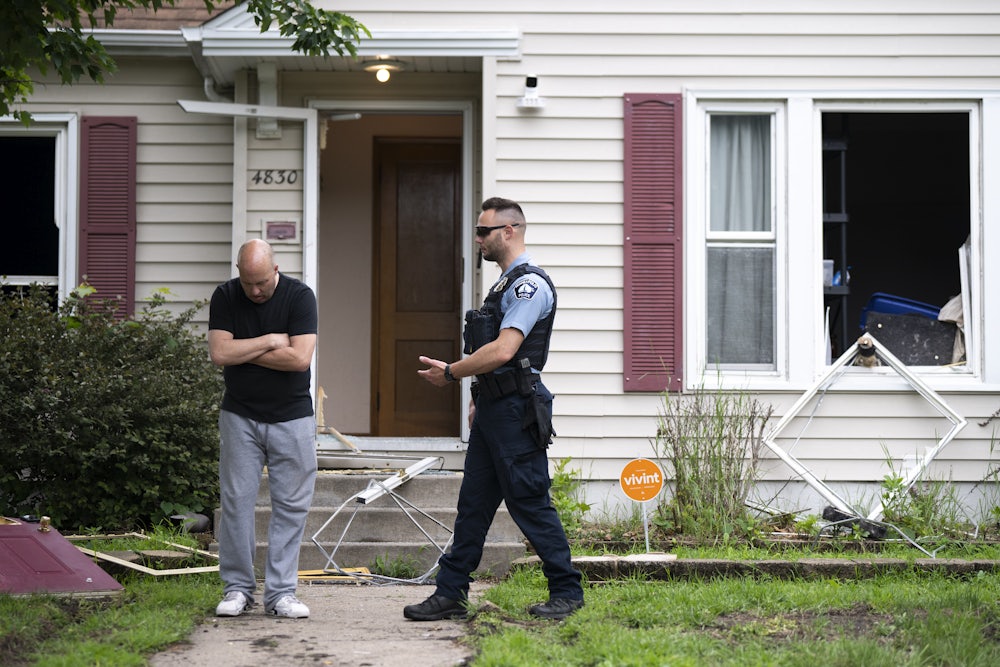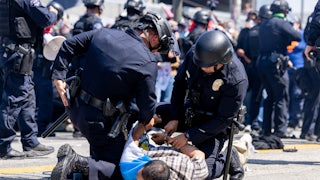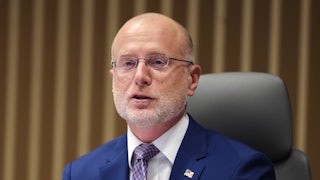Early Saturday morning in New Hope, Minnesota, a local law enforcement officer passed a parked black SUV with police lights. She did not know the nondescript white man seated behind the wheel was in the midst of an alleged assassination spree, stalking public officials at their homes, posing as a police officer at their doors, and, when they answered, opening fire. Neither did she have any idea that the suspected assassin was known as “Dr. Vance” to congregants at an evangelical church, where he was soft-spoken and swayed back and forth as he told them how he was saved when he was 17 years old. One day, he said, he realized he wasn’t living for God, but for himself. He wept at the revelation. He made a pamphlet of his “testimony,” he said, then went around town and “knocked on every door,” handing the pamphlet to anyone who answered.
In the predawn dark, the parked SUV looked like a squad car to the officer. She assumed the man was there for the same reason she was: to protect a public official who could be a target. She approached and tried to speak with him, according to a criminal complaint filed in federal court the next day. But the man just continued staring and said nothing. She drove on to do her welfare check on the official and saw no signs of distress. By the time additional officers arrived to join her, the SUV was gone. Within an hour, other officers found it parked in the driveway of the former speaker of the Minnesota state House, a Democrat. All told, the suspected assassin would drive to the homes of four public officials over the course of his hunt, shooting and severely wounding Democratic state Senator John Hoffman and his wife, Yvette, and killing Representative Melissa Hortman, her husband Mark, and their dog. A few hours after the shootings, according to the same criminal complaint, a 57-year-old struggling businessman and pastor named Vance Boelter texted a family group chat to say, “Dad went to war last night.”
Boelter, allegedly the nondescript white man who posed as a police officer, is now charged with multiple federal and state crimes connected to his plot to assassinate public officials, mostly Democrats, along with abortion providers. His online footprint is fairly minimal, and his beliefs and politics appeared mostly unremarkable to those around him. A friend told Wired, of the whole family, “They’re all nice people.” Another friend told the AP that Boelter was “right-leaning politically but never fanatical.” (Boelter was also a Trump voter, one longtime friend said.)
Boelter may have passed for “nice” and not “fanatical” because beliefs that were once considered the province of the far edge of the American right are now more commonplace: the demonization of political opponents, sometimes spoken of as literal demonic spirits; claims that opponents are threatening children and the American way of life; and an openness toward violence (and a willingness to look away from it) in order to secure political victories. This shift from the margin to the middle has also been successfully camouflaged; the political violence primarily waged by the right is often covered up with the notion that we as a country suffer from “polarization.” But these beliefs and politics come from somewhere, and we are overdue in exploring their origins, if only so we can better understand why they have managed to spread—and go relatively unnoticed—for so long.
“Who was he going to war against? Because they did not think of themselves as combatants,” said Matthew D. Taylor, the religious studies scholar and author of The Violent Take It by Force: The Christian Movement That Is Threatening Our Democracy, when we spoke two days after Boelter’s arrest. “Where did he get the idea that they were legitimate targets of violence? I think it’s coming out of a subculture that is both MAGA and spiritual.”
Taylor is working with the same set of limited data as the rest of us, and he was reluctant to speculate too deeply. But we know that Vance Boelter graduated from Christ for the Nations Institute, a Bible college in Texas. The nonaccredited institute may be somewhat marginal among American evangelicals, but it has been “an anchoring institution” for independent charismatic Christians for half a century, Taylor wrote in this book. Charismatics, as Taylor defined them, “emphasize the supernatural dimensions of Christian experience” in their beliefs and practices; independents are those who are not part of formal denominations. Charismatics have faith in and court direct experience of the Holy Spirit and what they call its gifts. Influential charismatics are now among Trump’s top spiritual advisers, such as Pastor Paula White-Cain, who delivered the invocation at Trump’s first inauguration, in which she referred to the United States as God’s “perfect gift.” Others have risen to prominence along with Trump, such as Lance Wallnau, who has asserted he was first to prophesize Trump’s coming. “Fighting Trump is fighting with God,” Wallnau said in 2020. Wallnau played a key role in mobilizing Christians on January 6, 2021. So did Dutch Sheets, a well-known charismatic who is also one of Christ for the Nation’s most prominent graduates and leaders.
Dutch Sheets may have done more than any other of the independent charismatics to bridge the movement with MAGA. In the period between the 2020 election and January 6, Sheets operated as a “one-man propaganda machine” for Trump (as Taylor and Bradley Onishi, author of Preparing for War: The Extremist History of White Christian Nationalism—and What Comes Next, put it), with his YouTube channel pulling in more than 200,000 views each day. It’s impossible at this point to say whether Boelter followed Sheets, but he comes from the Christian world in which Boelter was also educated and thus offers a window into Boelter’s background and possible motivations. We also don’t know whether Boelter continued to be part of any charismatic Christian communities in the U.S. after his schooling, but, as Taylor explained in a recent episode of the podcast Straight White American Jesus, “he’s very clearly charismatic in his theology and his preaching.”
At Christ for the Nations Institute, Sheets began to be radicalized, Taylor argued. He was exposed to dominion theology, “this idea of Christians taking control of the world to build the Kingdom of God on earth,” Taylor said, as well as the Pentecostal revival movement known as Latter Rain. After graduating, Sheets became a professor at the institute and a pastor at an institute-affiliated church, “a nexus of radicalization,” Taylor said. He would go on to draw together these strains of dominion theology and the Latter Rain to help shape a movement known as the New Apostolic Reformation. In 2013, Sheets was leading the institute, and was honored at graduation ceremony with a gift: a flag featuring a green pine tree on a white field, with the phrase, “An Appeal to Heaven,” with its origins reportedly in a Revolutionary War flag. Sheets interpreted this gift as a sign to activate a new “revolution” in America. He popularized the flag as a kind of Christian battle flag, and in the following decade, it would be carried by dozens of rioters on January 6, flown at the home of Supreme Court Justice Samuel Alito, and erected outside the Capitol Hill office of House Speaker Mike Johnson. This June, it flew briefly over the Washington building housing the Small Business Administration, erected in a ceremony attended by the agency’s head.
In the lobby of Christ for the Nations Institute in early 2024, a mural read, “Everyone ought to pray at least one violent prayer each day,” a quote from the institute’s founder. On a visit to the institute, the journalist Jeff Sharlet spoke to a student about what “violent prayer” meant. It was necessary, the student said, “to remind yourself every day that ‘the culture’—the rest of us, the unsaved—are the enemy,” Sharlet remembered. The student clarified: “‘Not you, in particular,’ he said. ‘Just, you know, the culture.’” That’s the two-step independent charismatics commonly deploy. They dismiss calls for violent prayer and spiritual warfare as calls for merely spiritual, not actual, violence. The discourse of spiritual war is an ordinary part of the vocabulary of the people who would be in Boelter’s orbit, Taylor told me. “I think you hear it in some of his preaching as well, this sense of demonic forces that are gathered against Christians and that need to be battled back.”
In this light, some of Boelter’s seemingly half-baked ventures—from ministry to private security, to international development—make a little more sense. “Reverend Vance Boelter” has been “ordained since 1993,” stated the website of Revoformation Ministries (according to an archived copy), a nonprofit organization Boelter said he heads, which has an IRS paper trail back to 2007 but no substantive activity. The site also claimed that Boelter “sought out militant Islamists in order to share the gospel and tell them that violence wasn’t the answer.” On the nonprofit’s most recent tax filing, its address was given as what appears to be a private family home, seen on Google Street View with a dark vehicle with police lights parked in the driveway. It is nearly identical to the vehicle recently on the home page (also now archived) for Boelter’s private security service firm, Praetorian Guard Services, which boasted, “Our presence, including vehicles, guards, and signs, is designed to say, ‘This isn’t a target worth looking at because the potential consequences would be too great.’”
Identifying himself as “Dr. Vance Boelter E.d.D., CEO of Red Lion Group” on LinkedIn, Boelter gives some hint of what he considered his real vocation: being a kind of entrepreneurial missionary. In fact, as Taylor explained, it’s a common type among nondenominational charismatics. “There’s a lot of people like this,” Taylor told me, “who’ve been trained and have some ministry background … [but] can’t quite make a career out of that, or for individual or familial reasons,” who still maintain “a kind of ministry platform or business or something, on the side.”
Over the course of four sermons given by “Dr. Vance” in 2021, 2022, and 2023 at La Borne Matadi, an evangelical church in the Democratic Republic of the Congo, Boelter had for perhaps the first time a significant platform, visible to thousands of people; his hosts also introduced him as a successful businessman. Over these sermons, Boelter’s remarks undeniably show animus toward people who he would say deviated from God’s plan, who support abortion and queer and trans people. But this appears alongside equally strident preaching against a church just as much in need of rescue, in the words of the independent charismatics he shares, by “apostles and prophets.”
In the years Boelter was preaching in the DRC, leading voices within the New Apostolic Reformation were going beyond “spiritual warfare,” making “disturbing claims that God is calling his people to organized vigilante violence,” as Frederick Clarkson and André Gagné observed at Religion Dispatches in 2023. They argue that when New Apostolic Reformation leaders refer to Democrats, feminists, and queer and trans people as “demonic,” scapegoating them for whatever social ills the leaders seek to eliminate, these leaders are using timeworn rhetoric that can prepare people to conduct “spiritual warfare” with material violence. Dutch Sheets had long been one of them, and he helped set the template, referring to Jesus as the “commander in chief” of a physical army and to fellow Christians as “potential soldiers.”
Boelter apparently preached, as Sheets does, that the church in America had failed to live up to its responsibilities. “Many churches in America didn’t listen to Jesus,” Boelter said in one February sermon. “They’re divided. This little group here, this little group here, this little group here, and the enemy—the devil—comes through and rips everything apart. The churches are so messed up they don’t know abortion is wrong—many churches. They don’t have the gifts flowing.” Gifts, for independent charismatics, refer to a deep, supernatural experience of power from the Holy Spirit flowing through them, and Boelter kept on the theme. “God gives the gifts to keep balance,” he concluded. “God will raise an apostle or prophet to correct their course.”
In addition to castigating the church, Boelter celebrated the power of God to “cut” into the hearts of people who are queer or trans to “free” them. “There’s people, especially in America, they don’t know what sex they are! They don’t know their sexual orientation. They’re confused,” Boelter said on another clip of a February 2023 sermon that has circulated widely on social media. “The enemy has gotten so far into their mind and their soul,” he said, putting a hand to his heart. He raised a Bible. “But this word cuts deeper.” God “goes down there and pulls that out, and he sets every person free.”
In his earlier sermons, which have received less scrutiny, Boelter delves into what drives his faith. If his mission work began at 17 with handing out a pamphlet on being saved, door-to-door, it eventually took him to the West Bank, Gaza, and Lebanon, he said. “The only time I would stop” approaching people, he claimed, “is when someone came up with a gun and said, ‘You need to come with me.’” He said he had been stopped by Israeli soldiers, Palestinian soldiers, U.N. peacekeepers, and “private security.” He told the story of an American murdered in Zimbabwe while on Christian mission work, after whom he named his own son. For Boelter, sharing the word of God meant living under such threats, all for doing what he had door-to-door in his own town: living for God. At the close of one sermon, he proclaimed, “If you’re getting closer to Jesus, you will win.”
Boelter’s possibly not-yet-realized armed private security firm, his ministry, his claims to have preached in dangerous places—it’s hard at first to connect all that with the guy who, now in his fifties, was renting a room from his elementary school “best friend,” where, between picking up odd hours working for a funeral home, he allegedly plotted a string of political assassinations. But all together they suggest that Boelter saw something bigger for his life—that he could be a fearless preacher, a guardian for hire, who traveled the world and was part of a movement of others like himself. “There are probably thousands of guys like this,” Taylor said on the recent podcast, who have some ministry training, who have a handful of business ideas, who maybe have fallen on hard times. “Radicalization can happen very, very fast.”
None of this is legible in the public comments from Vance Boelter’s friends. “I haven’t talked really about abortion with him for years,” his longtime friend and roommate, David Carlson, told a press gaggle on his front steps. “I don’t like abortion,” he said, gesturing to himself. “But I don’t go to this extreme.” He said Boelter listened to Infowars. But he didn’t want the media to paint Boelter as, in his words, a “crazy right-winger.”
As he was trying to make sense of why Boelter had gone so far, the friend said one thing that got at Boelter’s beliefs and possible motivations. “He had God,” he said. “I don’t understand it.” But what if that was exactly the problem?




